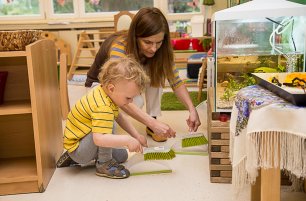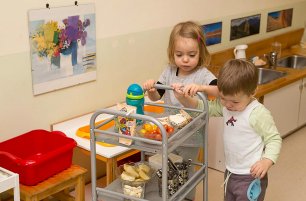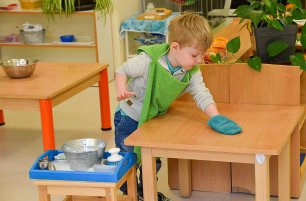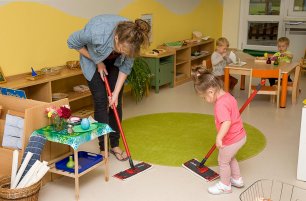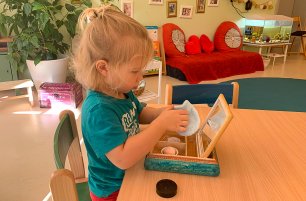Tidy Up! An Activity Your Toddler Will Love
Looking at our Toddler classrooms, even a casual observer will notice that half of the children’s time seems to be spent cleaning. They’re busy sweeping, wiping, mopping, scrubbing and brushing; even almost antiquated activities, such as washing laundry by hand or polishing wood and metal objects, have their place.
Some might suggest that all this cleaning is taking away from their academic activities and developmental materials... but in Montessori, we know it doesn’t get much more academic and developmental for a toddler than exercises like these. The best part? They are also perfectly suited to adapting for your home!
Your toddler is naturally motivated by seeing you attend to activities like these every day. They want to be a part of the daily life of the household, and participate meaningfully in its running. All they need is for us to give them the opportunity. When we do, the benefits include rapid development of motor skills, increased executive functioning, positive development of the ego, confidence and self-image: in other words, your toddler will turn calmer, happier, more capable and independent. And that says nothing of all the domestic chores you will no longer need to do!
To set up your own „practical life“ curriculum in your home, look for items that are well sized for your child’s body and thus easy for them to manipulate (nothing will frustrate and discourage your child more than equipment that is literally giant-sized compared to their size). Household and kitchen stores are full of hidden gems, and often all you need to do is to take scissors to the rags and sponges, or cut the broom and mop handles to half-size. Make the equipment attractive, colorful, well-ordered and easily accessible so that your child can get it whenever they need.
WIPING
An all-purpose rag, sponge or towel will be something your toddler will use ten times a day, guaranteed.

MOPPING
Properly cleaning floors usually needs more water (and harsher chemicals) than you want your toddler to have access to. We offer just a dry mop for cleaning up small spills - an incredibly popular activity.

SWEEPING
Sweeping requires a lot of tricky full-body coordination, and is therefore a fantastic challenge for a two year old and older.

CARRYING
The easiest activity in the book, and something every child capable of walking should be required to do is tidying up! Whether carrying dirty laundry to the hamper, dishes to the sink or toys to the shelf, let your child move things. Bonus points (in their eyes!) for utilizing a wagon, trolley or basket.

By Michaela Tučková
Want to learn more? Read our next article:
